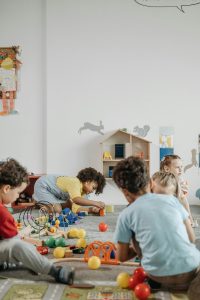1.9.5 Grammar activities: social/human gender
Social/human gender:
We previously learned how some words (nouns, adjectives, articles) have a grammatical gender and how their endings help us identify that. When that word refers to an object, it seems a bit artificial, but when it comes to words that refer to persons that does not feel so arbitrary. We rely on other cues to know the gender of a person and also, words like “woman/mujer” or “man/hombre” already give away the gender literally.
The ending of the word also helps us know the gender: la niña juega con su hermano or el niño juega con su hermana are very different sentences.
That means we usually agree other words in our sentences without thinking too much about it.
An example is for instance this picture:

Ella mira el atardecer or la mujer mira el atardecer seem to be 2 possible captions for this picture. But why?
When we choose words, we guide our decisions on human gender by socially constructed ideas of what a masculine or feminine gender should look like.
What do you think made you decide to gender the person in the picture as a woman?
And how about this picture?

Notice that bebé has an ending that is neither a or o, like niño o niña.
How do we know the personal/social gender to construct a sentence? ¿El bebé o la bebé ? How do we know other than asking the parents? We don’t. Bebé is a word that has no gender until we assign a reference in the world.
Also, as you know, we could use neutral articles that do not assign a gender, like “le bebé.”
Generic masculine:
There is something interesting about Spanish, which is what we call the generic masculine: if in a group of people there are women identified and man identified individuals, you can still use the masculine to refer to all of them.

Los niños juegan.
We do however have inclusive endings that can be neutral, so to respect everyone’s differences in gender, including non conforming gender identities. And guess what is that ending if it’s not “a” or “o”? It’s “e”, like in bebé.
So for instance, you could say: el niño, la niña, le niñe.
Activities: personal/social gender
- ¿Do these sentences have the correct gender agreement?
-

